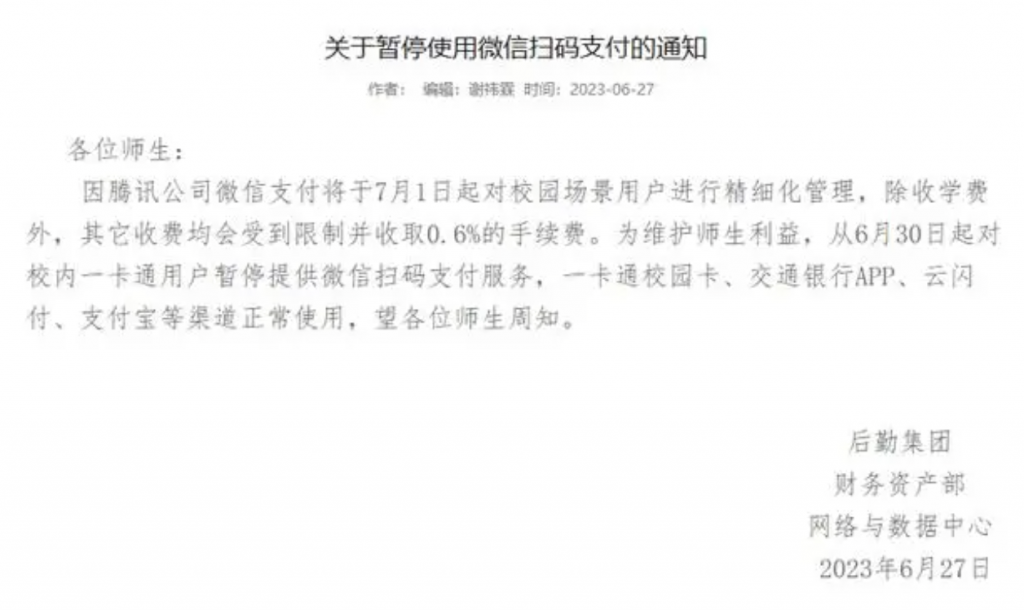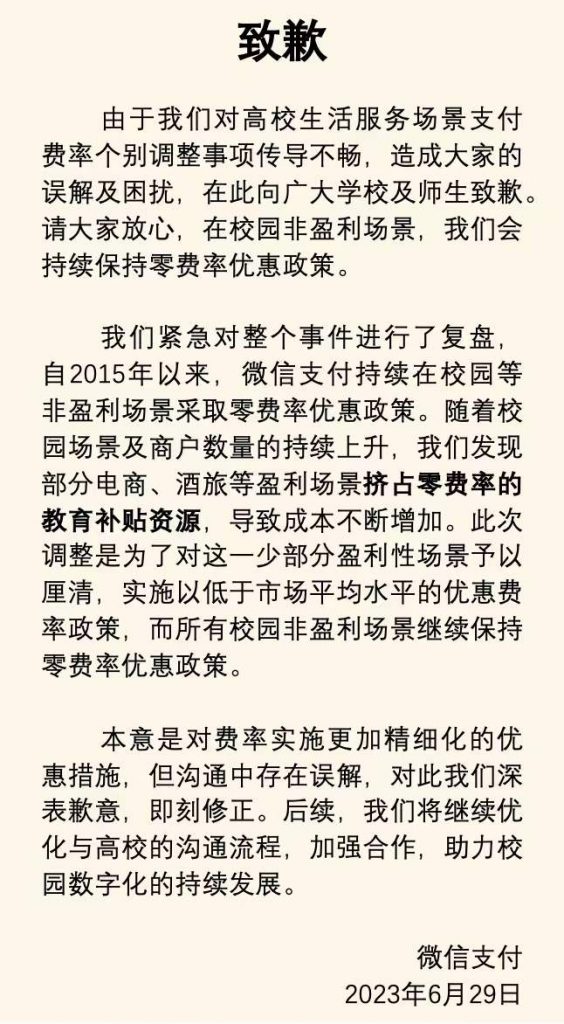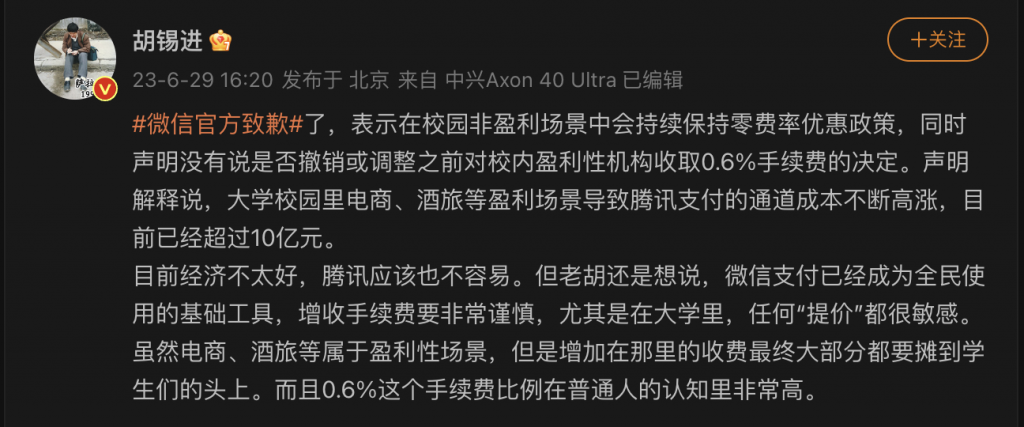Original link: http://weiwuhui.com/10664.html
one
Recently, many colleges and universities have announced that they will stop using WeChat payment.
For example, Northwestern University issued an announcement:
In addition, Zhengzhou University of Light Industry, Zhoukou Teachers College and many other colleges and universities announced their follow-up.
WeChat issued an apology announcement, saying that there may be a misunderstanding. In the subsequent statement, it is actually planned to charge a rate of 0.2% for profit-making scenarios on campus, not 0.6%. The campus tuition and fees and life service scenarios are 0 rates.
This incident seems to be a big one, so Hu Xijin also came out and said a few words: ——As for the transaction fee rate of the profit-making scene of e-commerce and wine tourism, most of the transaction fees will be shared on the students, Hu Xijin pretends to understand It still pretends not to understand, which will be mentioned later.
The above is the background of the news.
Wechat payment, which is used by almost every Chinese person today, is actually not well known about the operating mechanism behind it. In addition, there are some special policies in the field of education, so it is worth talking about it.
But there is one thing to keep in mind: this is all a matter of settlement between institutions such as schools, merchants, Tencent, and banks, and it is difficult to have any perception in front of consumers.
two
From a consumer’s point of view, when you spend in any place and take out WeChat to pay, you may encounter two situations:
First, the merchant said, I show the code, you scan me.
Second, the merchant said, you show the code, and I will scan it for you.
The first situation occurs on some very small vendors (and usually in some fringes or junctions), the second is more common. Slightly large-scale consumption scenes are all scanned by consumers with bright codes and merchants.
This is called an acquiring business. In this kind of business, third-party payment (such as Alipay) including WeChat payment actually charges a handling fee. The specifics are different in each industry, assuming that the rate is 0.2%. In other words, if you spend 1,000 yuan, the merchant will get 998 yuan.
As for sometimes, you will find that no matter whether you show the WeChat code or the Alipay code, it is solved by a machine, and there is also a layer of agency. But all in all, merchants get 998.
This kind of business, which is equivalent to a commission, has existed for a long time, and it is not worth making a fuss about. Swipe the bank card, and the bank card will also set the transaction rate. It’s just that in the offline acquiring business, the merchant side basically doesn’t have anything to do with banks anymore.
But things are not over yet. On the consumer side, there are still stories happening.
When you show your WeChat payment code and spend, for example, 1 yuan, and you haven’t grabbed a red envelope for many years, you don’t have this 1 yuan in your WeChat wallet, so you need to transfer it from a certain bank card you bound. At this time, the bank will charge a handling fee: it is equivalent to charging money for non-peer transfers!
To whom? You definitely don’t agree that transferring 1 yuan from the bank card to WeChat payment is less than 1 yuan, but WeChat payment needs to pay the bank transfer fee.
three
When we understand this process, we will understand what the so-called “education subsidy” in the WeChat apology is all about.
According to relevant state regulations, education is a special field. For example, if you pay tuition fees, you can easily pay tens of thousands of dollars. Whether you pay with a bank card or WeChat, you cannot set a transaction fee rate. This is a free strategy equivalent to public welfare.
This regulation is very rigid, and no financial institution dares to touch the idea of tuition payment. Therefore, in the announcement of Northwestern University, it also admitted that WeChat payment for the tuition fee does not mean to charge a fee rate.
But the special field of education is that after large-scale crowds (teachers and students) gather, there are always some daily consumption that no one can bypass. For example, the cafeteria.
The canteens in Chinese schools are actually subsidized, and the prices of meals are different from those on the market. Therefore, many schools do not welcome non-school teachers and students to eat in the school cafeteria, and the way of expression is that they do not accept cash consumption. In the past, it was a campus card that only teachers and students had. The behavior of depositing money from a bank card to a campus card is called “loading”, and there is no transaction fee rate. In 22 years, there was a news that a certain bank wanted to set up a thousand deposits in the campus card of Xinhua Middle School in Shijiazhuang City. The transaction fee rate of six was finally given up.
But now that WeChat payment is so popular, what will happen after the introduction of this payment method?
Take a university as an example.
The school has developed a WeChat mini-program as a tool for consumption in the cafeteria (in order to prevent outsiders from taking advantage, this mini-program requires a campus account to log in, so it is unlikely that WeChat payment can be used in the cafeteria). Scan it on the machine to complete the settlement. And in the account of this small program, users need to transfer money from WeChat payment. The previous problem appeared: the user had no money in his WeChat wallet, but transferred money from his bank card. Therefore, the fee that the bank should charge will not be less, and the object of the charge is of course WeChat payment.
This is the education subsidy that WeChat Pay has been talking about. To be honest, I have always felt that this word is not good, and it is very difficult to understand what it is. I thought that Tencent distributed money to schools all over China. Of course, Tencent, which is engaged in zero-fee rates, is indeed posting money there.
Four
The canteen is also a relatively standard institution in the field of education.
Now the scope of the problem is a little bigger, what should the merchants in the school do? For example, a small shop selling drinks, a small shop selling noodles, or, a bookstore? printing shop?
The situation here is complicated. Bookstores, I believe everyone will see that the bookstores in schools are generally called “educational bookstores”. Yes, there is no transaction fee for buying books in this way, and WeChat payment needs to pay the transfer fee charged by the bank. It seems that many printing shops have a code posted on the wall by the merchant, and everyone scans it by themselves. Of course, there is no transaction fee rate. But the noodle shop in the beverage shop is really hard to say.
The “e-commerce, wine travel” scenario mentioned in the WeChat payment announcement is even more unclear in the education industry whether it is profitable or not. Some schools open their own stores to sell goods, such as peripherals, a school sells a key ring for 20 yuan, and it is an IP business. There is also a school that built a hotel because it encloses a large piece of land, saying it is for internal use of academic activities, but in fact it is still open to the public—that is, you can book it on Ctrip. Are these for-profit or for-profit?
Therefore, it is really overthinking to say that the transaction fee rate of this kind of business will be apportioned to the students as Hu Xijin said.
five
On the evening of the 29th, WeChat officials issued another announcement. Regarding the “campus payment rate”, I asked about WeChat payment
First of all, I want to say that even if the fee rate is charged, it is 0.2%, not the legendary 0.6%-this is the market price outside the campus, and we do not intend to use this standard. And it has to be collected “finely”. Some scenes are still not accepted. The so-called fine-grained collection, I guess, is that WeChat has to judge whether this scene is for profit or not, and whether that scene is for public welfare.
The second point is more important, the full text is as follows:
Due to our insufficient consideration of the division of campus profit scenarios, the original rate adjustment involves the life service scenarios operated by the main body of the school. After collecting opinions and feedback from all parties, we have decided to maintain the zero-rate preferential policy for the above life service scenarios At the same time, a 0.1% technical service fee will still be issued to partners who provide services and technical support to the school.
0.2% said they gave up. Tencent does not intend to refine the distinction between scenarios. Frankly speaking, as a teacher who has been in college for nearly twenty years, I really don’t think it will be practical.
For example, the parking fee charged by a certain school district to outsiders is really not cheap, at six yuan per hour, which is almost the same as that in ordinary external lots. Is this a for-profit scenario?
So, since you can’t tell the difference, don’t accept it. Continue to fill in the “education subsidy” pit that the bank may charge transfer fees.
But this has a premise, the premise is “the life service scene operated by the main body of the school”, that is to say, the school parking lot, I recognize it. However, if there is another business entity running in to open the store, which is obviously not operated by the school entity, there will still be a charge. In light of the context, two thousandths is charged.
As for another pit that requires subsidies for WeChat payment: “At the same time, a 0.1% technical service fee will still be issued to partners who provide services and technical support for the school.” Basically, it should fall on the “acquiring service provider”, that is, me. As mentioned earlier, no matter what code you show, it is a POS machine provider that can charge you with a code deduction.
six
In general, the details of the matter are like this. Whether the consumption scene is for profit is the focus. Tencent feels that it is not unreasonable for me to fill in the for-profit campus scene, which is not incomprehensible. I am even willing to use the rate of Qianer, if I can, I will charge a little.
But the difficulty is indeed in the big basket of education, and it is really very difficult to distinguish.
Colleges and universities may have been too nervous about this matter in the early stage. When the announcement was made, and it was not the case in retrospect, Northwestern University deleted it.
To be honest, the college logistics group stuff is even more twists and turns.
That is another story that is not easy to write as a college teacher.
—— The first episode of pulling nitrogen ——
This article is transferred from: http://weiwuhui.com/10664.html
This site is only for collection, and the copyright belongs to the original author.


